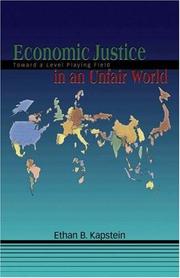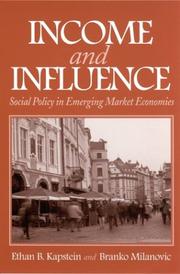| Listing 1 - 3 of 3 |
Sort by
|

ISBN: 0691117721 0691136378 9786612964725 1400837596 1282964720 9780691117720 9781400837595 9780691136370 9781282964723 Year: 2006 Publisher: Princeton, N.J. : Princeton University Press,
Abstract | Keywords | Export | Availability | Bookmark
 Loading...
Loading...Choose an application
- Reference Manager
- EndNote
- RefWorks (Direct export to RefWorks)
Recent years have seen a growing number of activists, scholars, and even policymakers claiming that the global economy is unfair and unjust, particularly to developing countries and the poor within them. But what would a fair or just global economy look like? Economic Justice in an Unfair World seeks to answer that question by presenting a bold and provocative argument that emphasizes economic relations among states. The book provides a market-oriented focus, arguing that a just international economy would be one that is inclusive, participatory, and welfare-enhancing for all states. Rejecting radical redistribution schemes between rich and poor, Ethan Kapstein asserts that a politically feasible approach to international economic justice would emphasize free trade and limited flows of foreign assistance in order to help countries exercise their comparative advantage. Kapstein also addresses justice in labor, migration, and investment, in each case defending an approach that concentrates on nation-states and their unique social compacts. Clearly written for all those with a stake in contemporary debates over poverty reduction and development, the book provides a breakthrough analysis of what the international community can reasonably do to build a global economy that works to the advantage of every nation.
Distributive justice. --- Economic development --- Economic policy --- International economic integration. --- International economic relations --- Moral and ethical aspects. --- Distributive justice --- 337.01 --- bedrijven, ethiek --- 334.10 --- 338.340 --- AA / International- internationaal --- Common markets --- Economic integration, International --- Economic union --- Integration, International economic --- Markets, Common --- Union, Economic --- Distribution (Economic theory) --- Justice --- Social justice --- Wealth --- Moral and ethical aspects --- Algemene economie : algemeenheden --- Algemene ontwikkeling in de Derde Wereld --- Moral and religious aspects --- International economic integration --- DISTRIBUTIVE JUSTICE -- 330.34

ISBN: 0585469679 0880992700 9780585469676 9780880992701 0880992697 9780880992695 9780880992701 Year: 2014 Publisher: Kalamazoo : W. E. Upjohn Institute for Employment Research,
Abstract | Keywords | Export | Availability | Bookmark
 Loading...
Loading...Choose an application
- Reference Manager
- EndNote
- RefWorks (Direct export to RefWorks)
Income distribution. --- Mixed economy. --- Poor. --- Social policy.
Book
ISBN: 1107189365 1281944823 9786611944827 0511817800 0511456190 0511457502 0511454465 0511453485 0511455496 9780511457500 9780511456190 9780511817809 9780521494236 0521494230 9780521732628 052173262X 0511736657 Year: 2008 Publisher: Cambridge Cambridge University Press
Abstract | Keywords | Export | Availability | Bookmark
 Loading...
Loading...Choose an application
- Reference Manager
- EndNote
- RefWorks (Direct export to RefWorks)
The recent backlash against democracy in such countries as Bolivia, Venezuela, Russia, and Georgia poses renewed concerns about the viability of this regime type in the developing world. Drawing on a unique data set of every democratization episode since 1960, this book explores the underlying reasons for backsliding and reversal in the world's fledgling democracies and offers some proposals with respect to what the international community might do to help these states stay on track toward political stability. Rejecting earlier scholarship on this topic, Kapstein and Converse argue that the core of the problem is found in the weak institutions that have been built in much of the developing world, which encourage leaders to abuse their power. Understanding the underlying reasons for democratic failure is essential if we are to offer policy recommendations that have any hope of making a difference on the ground.
Democracy --- Democratization --- Political systems --- Law --- General and Others
| Listing 1 - 3 of 3 |
Sort by
|

 Search
Search Feedback
Feedback About UniCat
About UniCat  Help
Help News
News